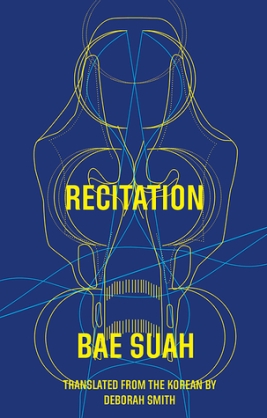I received an advance review copy of this title from Deep Vellum via Edelweiss.
My Review:
 Both of Suah’s books that I have read, A Greater Music and Recitation, are relatively short as far as novels are concerned, but both books took me a week to read; because of their complexity and language dense with poetry and philosophy they required and demanded my full attention. When Recitation opens, the main character, Kyung-hee, is in a train station in a European city but has no hotel reservations or a specific address to stay. She is waiting for a person whom she has never met, a fellow-wanderer introduced to her by a friend who has agreed to let her sleep in his living room for a few days. When the fellow-wanderer stands her up, Kyung-hee meets a group of Korean immigrants who become fascinated with her and they take on the role as the narrators of her story.
Both of Suah’s books that I have read, A Greater Music and Recitation, are relatively short as far as novels are concerned, but both books took me a week to read; because of their complexity and language dense with poetry and philosophy they required and demanded my full attention. When Recitation opens, the main character, Kyung-hee, is in a train station in a European city but has no hotel reservations or a specific address to stay. She is waiting for a person whom she has never met, a fellow-wanderer introduced to her by a friend who has agreed to let her sleep in his living room for a few days. When the fellow-wanderer stands her up, Kyung-hee meets a group of Korean immigrants who become fascinated with her and they take on the role as the narrators of her story.
Recitation is, among other things, a reflection on what it means to feel at home somewhere in the world, it is a commentary on why we feel grounded and at peace in some places but not in others. Kyung-hee travels around Europe and Asia, never staying in one place for very long. She doesn’t identify herself as Korean, Asian, or the resident of a specific city, but instead she calls herself a “city dweller.” The specific cities to which she travels are vague and not the focus of the text; each city becomes for her a palimpsest upon which she can inscribe her own experiences anew with each visit. She identifies with the Starbuck’s logo more than any other symbol because it is the one thing that remains the same no matter where she goes.
Kyung-hee meets people to whom she does not assign specific names—the healer, the teacher couple, the German teacher, the East Asian man. Even her lover is simply assigned the name of “Mr. Nobody.” One of the few people she meets that she does call by name is Maria, but Maria is a shadowy figure that lingers in the background for much of the book with no specific details given about her life. We only learn at the end of the story that Kyung-hee meets Maria in Berlin and Maria has allowed hundreds of travelers stay at her home throughout the years. Another interesting detail about the people she meets is that they are all somehow connected. The German teacher introduces her to the teacher couple and Mr. Nobody introduces Kyung-hee to his son Banchi who also knows Maria. It is Maria that introduces Kyung-hee to the community of Karakorum who are a tribe of global dwellers, never staying in one place for very long and for whom the mere fact of their wandering makes them uniquely connected and a type of community.
The most interesting and compelling part of the text for me was Kyung-hee’s descriptions of her job as a recitation actress and how an incident one night on stage gave her the motivation to travel the world. As she is in the middle of a recitation, she walks across the stage and breaks her toe which causes her a great deal of pain. When she gets the cast off of her foot she has a revelation:
It was probably the incident with the plaster cast that brought about that desire to detach myself from a specific location, to free my material self from being tied to a given set of coordinates, fixed in a single place. Looked at from a certain angle, perhaps its more accurate to call my soul the author of that shriek of despair, and relegate my toe to the role of intermediary.
In addition, Kyung-hee describes her childhood in Seoul as she grows up under the strict and abusive authority of her parents. They have little love and affection for their daughter and control every aspect of her life, including the types of books she is allowed to read. She has a sister who is much older than her whom she rarely sees or interacts with. In addition, her older sister is not subjected to the same harsh rules as Kyung-hee. She lays around the house most of the day, has no job and smokes in her room without drawing any type of criticism from their parents. One night Kyung-hee’s sister appears to her naked in her bedroom and her sister attempts to strangle her. There are many layers of intriguing imagery that Suah weaves throughout the story of the sisters that makes us question their relationship and connection to one another. After reading this part of her story I viewed Kyung-hee as less of a woman possessed with a sense of wanderlust and more of a refugee; she has been forced out of her home by the cruelty of her family and can never return to that home.
Suah’s book ends on a vague note which is fitting for the rest of the narrative in which time, places and characters oftentimes blend together and become blurred. Kyung-hee herself becomes a shadow of a figure; has she been real all along and since she never had a fixed home will anyone remember that she ever existed? Is Kyung-hee destined to be one of those nameless refugees that are exiled from their home, never to return to a place of comfort and familiarity? The Karakorum reminded me of the Greek concept of xenia which demanded that men give each other a warm place to stay, a meal and entertainment when they were traveling. If a Greek did not offer such hospitality to a fellow traveler then he could be ostracized from his community and the same hospitality would be denied to him as a traveler. Wouldn’t the world be a much better place if we extended the idea of xenia especially to refugees who are in the greatest need of comfort and hospitality?
About the Author:
 Suah Bae is a South Korean author who was born in 1965.
Suah Bae is a South Korean author who was born in 1965.
Suah Bae graduated from Ewha Womans University with a degree in Chemistry. Originally a government employee at Gimpo Airport in Incheon, Bae wrote stories as a hobby. At the time of her debut in 1993, Bae Su-ah (1965~ ) was a government employee working behind the embarkation/disembarkation desk at the Kimpo international airport in Seoul. Without formal instruction or guidance from a literary mentor, Bae wrote stories “as a hobby” while working at the airport; but it wasn’t long before she left her stultifying job to become one of the most daringly unconventional writers to grace the Korean literary establishment in modern years.



This book sounds fascinating, Melissa. Apposite for both your country and mine at the moment.
LikeLiked by 1 person
Thanks, Susan! That’s exactly what I was thinking.
LikeLiked by 1 person
How I wish it wasn’t so!
LikeLike
ah this is interesting for fairly recently i had read her ‘nowhere to be found’ and it had the same atmosphere of being a stranger in your home. and also, a shadow figure, the self very determined by not belonging anywhere… so it seems to be the same theme in all her writing…
and i wholeheartedly agree with extending the xenia….
LikeLiked by 1 person
A Greater Music is the same way. The main character is a Korean living in Berlin and never quite comfortable living at home or abroad.
And if only we could all embrace xenia!
LikeLike
I have just got a copy of this (it will be the my first exposure to her work) and I’m looking forward to reading it.
LikeLike
Elements of this book remind me of The Vegetarian by Han Kang, which I just finished reading yesterday. She’s also South Korean.
LikeLike
Pingback: Women in Translation and Women Translators |